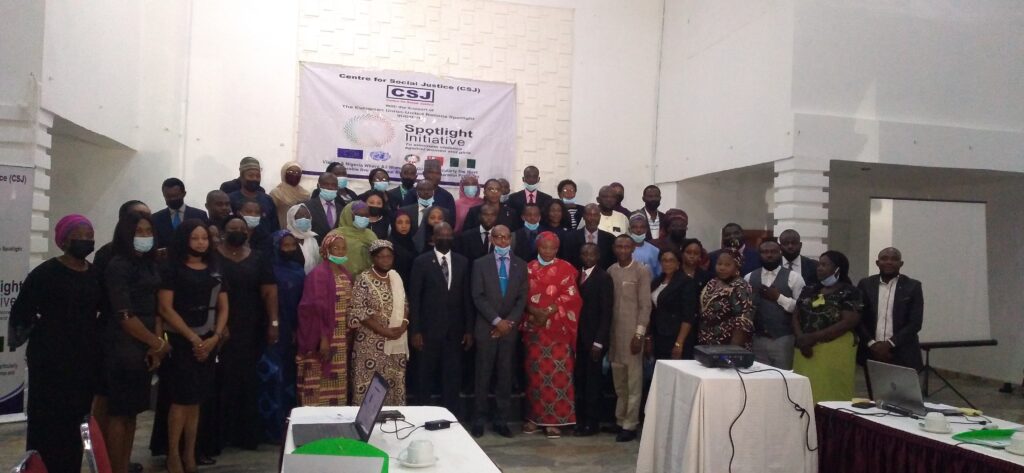CSJ Trains Rule of Law Institutions from Adamawa, Sokoto and the FCT
-
March 12, 2021
- Posted by: Center for Social Justice

The centre for Social Justice in Nigeria (CSJ), in her bid to ensure the safety of the woman and girl child in Nigeria, embarked on a two-day capacity training workshop for rule of law institutions in Abuja. The event which was held at 3J’s Hotel Utako, Abuja on the 8th and 9th of March 2021 featured participants from Adamawa and Sokoto, States who have recorded large instances of various forms of gender-based violence. The event also featured institutions from the federal capital territory. The training was targeted at strengthening the capacity of legal practitioners in the Ministry of Justice, Legal Aid Council, NAPTIP, FIDA, NBA and Police on legal provisions, judicial precedents, international standards and comparative experience, innovative approaches and fair trial procedures that take cognizance and balance the rights of survivors and accused persons in cases of SGBV/VAWG/HP and promotion of women’s and girls SRHR.
The training themed litigation and legal responses to SGBV/VAWG/HP and SRHR was graced by some of the best legal professionals in Nigeria. One of such people were Dr Chike Okosa, who took a paper on Prosecution of Sex-based Offences under the VAPP Act: A Defence Lawyer’s Response. In his presentation, Dr Chike Okosa went deep in the analysis of the VAPP Act, pointing out possible flaws in the VAPP Act that a defence lawyer will most likely use in court and how to counter such flaws. The paper was a breakdown of various parts of the VAPP Act in related subheadings like rape, sexual offenders register, female circumcision, compensation for victims etc. The presentation showed there remains a couple of things that need to be ironed out in the VAPP Act to ensure it solves problems rather than creating them. One of such problems is the need for a sexual offender register which has the name of people convicted for several sex offences. According to Dr Chike, every sentence has a terminal date but it was not specified how long a name should be on the register. This will end up subjecting the convict to further profiling in the society.
Dr Chike also presented a second paper titled Proposal on operations of the Crime Victims Compensation Program under the VAPP Act. The purpose of the compensation program according to him is just to aid in the recovery of the victim’s physical and mental health and not necessarily to erase the trauma of the crime. But the compensation system is not void of problems especially as regarding funding the compensation. It has been debated in various quarters who should fund the compensation: the offender or the Government? When the offender is to fund the payment, situations rise when the offender can’t afford it whereas it sounds improper to use tax payer’s money to compensate victims. Suggestions from some of the participants was to initiate a work scheme for indigent offenders to work, earn and pay compensations without necessarily burdening the Government. Dr Chike also pointed out that the VAPP Act states clearly that the state will pay compensation for victims of crimes committed by state agents. In his conclusion, Dr Chike said that the VAPP Act is still a young law and will have to go through several modifications to be perfect for the Nigerian society.
Another paper presenter was Barr. Kalu Onuoha, who made a presentation on Rape under the VAPP Act 2015. This was very necessary giving the latest rise in the number of rape cases since the inception of the novel corona virus. Hence it is pertinent to equip rule of law institutions with the right knowledge and skills to ensure that the scourge of rape is nipped in the bud. Barr Kalu gave a conceptual framework of rape under the VAPP Act because of some instances the older laws did not take into consideration. The VAPP Act has widened the traditional definition of rape. It is no longer gender specific and penetration does not have to be penile but insertion of any part of the human body or even objects would suffice. In summary, he pointed out that rule of law institutions must be familiar with this law to ensure convictions.
Finally, participants were divided into groups to discuss challenges faced in the discharge of their duties and recommend ways in which it could be improved.
